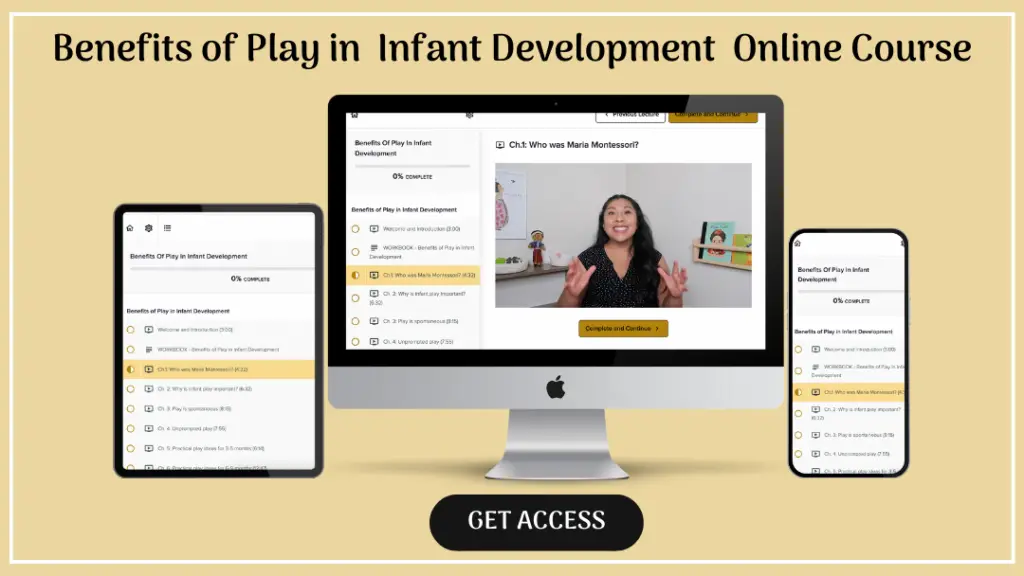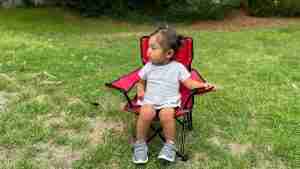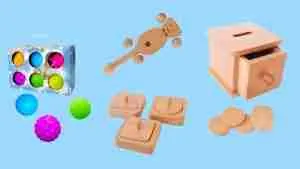
5 Montessori Tips To Encourage Independent Play In Infants And Toddlers
Benefits of independent play to boost confidence, creativity, and resilience
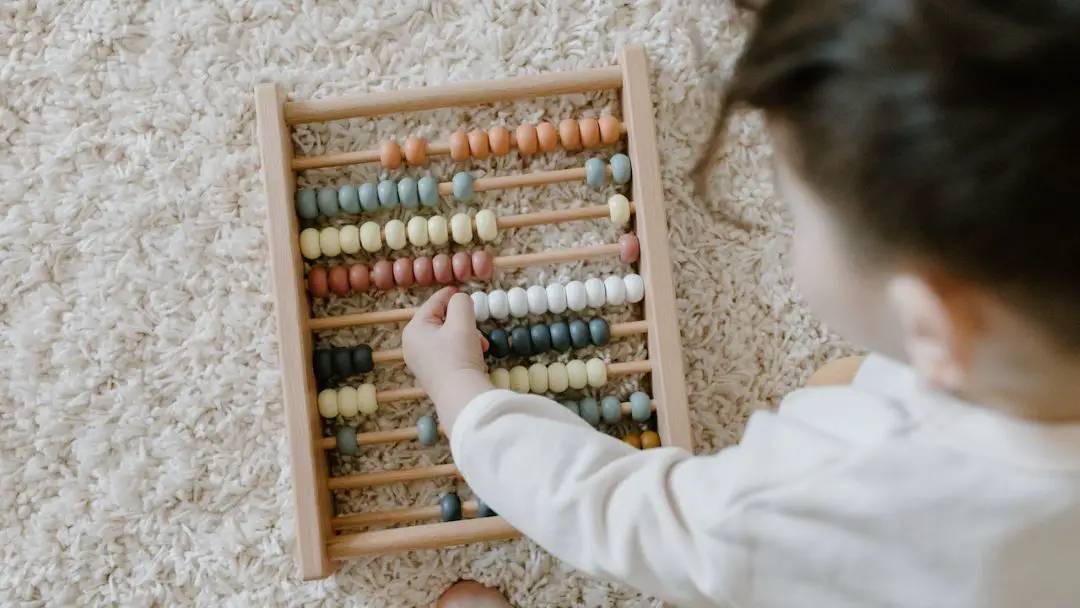
*Disclosure: I only recommend products I would use myself and all opinions expressed here are our own. This post may contain affiliate links that at no additional cost to you, I may earn a small commission. Thank you for your support!
Independent play is one of the main ways infants and toddlers learn how to communicate, socialize, move, and collaborate with others. But sometimes children need some alone time to play by themselves. Independent play is important to your child’s development and growth.
- What is independent play
- Difference between playing and entertaining
- How to encourage independent play in infants and toddlers
- At what age should a child play independently?
- Why is it important for a child to be independent?
- Montessori tips to encourage independent play in infants and toddlers
I am excited to share this information with you so let’s get started!
What is independent play?
We love spending time with our babies, playing with them, and helping them develop life skills. But sometimes we have to step back and let our children play alone.
Independent play is when we allow our children to play by themselves with us nearby to supervise or ensure their safety. Infants and toddlers need some time to be alone in their safe environment and develop life skills through independent play.
Allowing your child to play independently without interfering has so many benefits like gaining independence, encouraging creativity, and helping with problem-solving. I will describe some of the main benefits of independent play in babies later in this article.
Difference between playing and entertaining
It is vital to know the difference between playing and entertaining and how it impacts your child’s long-term success.
In this context, entertainment can be watching TV, going to the movies, playing video games, or having a structured day with no free play. Entertainment can deprive children of their imagination and creativity. Of course, there is a time and place for entertainment but when it comes to the development of your child, encouraging independent play should be prioritized.
Independent play activities like hiking help your little ones observe their surroundings, touch plants and trees, pick up rocks of different textures and sizes, jump in puddles, race up a hill, or build a dam in creeks or rivers.
It is very important to identify Montessori independent play activities that help your child develop life skills. I cover play activities and more in my online course, Benefits of Play in Infant Development.
Benefits of independent play
Some benefits of Independent play include improving physical and cognitive skills. Children love to play because it is fun and natural for their development. During play, children learn, practice, and master communication, critical thinking, collaboration, problem-solving, and emotional skills.
Why is it important for a child to be independent? Sometimes a child’s creativity becomes limited when parents engage in play with them. For example, if a child is playing with building blocks, a parent might tell the child how to stack them or where to put them. This only takes away a child’s ability to think critically.
Independent play allows children to use their creativity and imagination. Just give your children some space and observe how creative they get. After working in the Montessori setting for many years, I have witnessed how independent play helps children grow.
Social independence is another great benefit children gain from playing independently. I know this may sound counterintuitive because we want our children to be social. But isn’t it also great when our children can problem-solve on their own?
Without the interference of the adult, children are given the opportunity to find solutions to problems on their own. By following the Montessori principles, children learn how to navigate problems on their own and implement the right solutions.
5 Montessori Tips To Encourage Independent Play

So how can you encourage independent play in infants and toddlers? Montessori independent play is possible for most children. Age-appropriate activities must be chosen so the child engages with them.
1. Let your child take initiative
Sit next to your children and simply watch them engage in the activity. Give them the opportunity to take initiative instead of you making the first move or telling your child what to do. Once your child begins to play independently, you can slowly step away when they are focused on the activity.
2. Create the right environment to encourage independent play
Design a safe play area for your child. Instead of bringing out a huge box of toys when you want your child to play, you can place a small shelf with a few toys that can be rotated. This will allow your child to select an activity he is interested in. Read more on how to create a Montessori home environment.
3. Limit screen time
I know it is extremely difficult to remove screen time at all. We live in an era where we need our phones, laptops, and TV for work and/or entertainment purposes. Limit screen time by giving your child developmentally appropriate toys, creating art, or going for hikes.
4. Let go of expectations
There may be milestones that you feel your child should meet by a certain age, but remember that children are unique and grow at their own pace. Independent play in infants and toddlers is about gaining the right life skills and not trying to meet societal expectations.
5. Observe your child
You will learn so many things about your child simply by just observing. Pay close attention to what they engage with, stare at, or what items they gravitate towards. If they seem to be uninterested in certain toys, remove them and replace them with age-appropriate ones.
You can check out other great ways of encouraging independent play in this article by PBS.
At what age should a child play independently?
At what age does independent play start? Newborns will spend most of their time sleeping and eating. They depend a lot on you and you will provide the right activities for their development.
Independent play for infants looks different than independent play for toddlers. Many infants begin to play on their own, whether it is batting at mobiles or making sounds with their voices.
Our toddler began batting at objects when she was about four months old. We have the Lovevery Play Gym that comes with various tools to help with her overall development, including hanging mobiles. We gave her space and observed her interaction with her mobiles.
Whenever she seemed uninterested in certain mobiles, we switched them to keep her engaged.
Once babies are able to crawl or walk, you can provide other toys or activities so they can play independently. Again, it is a matter of observing your child and catering to their needs. Lovevery has amazing Play Kits to allow your child to play independently for longer periods.
What Is An Example Of Independent Play?
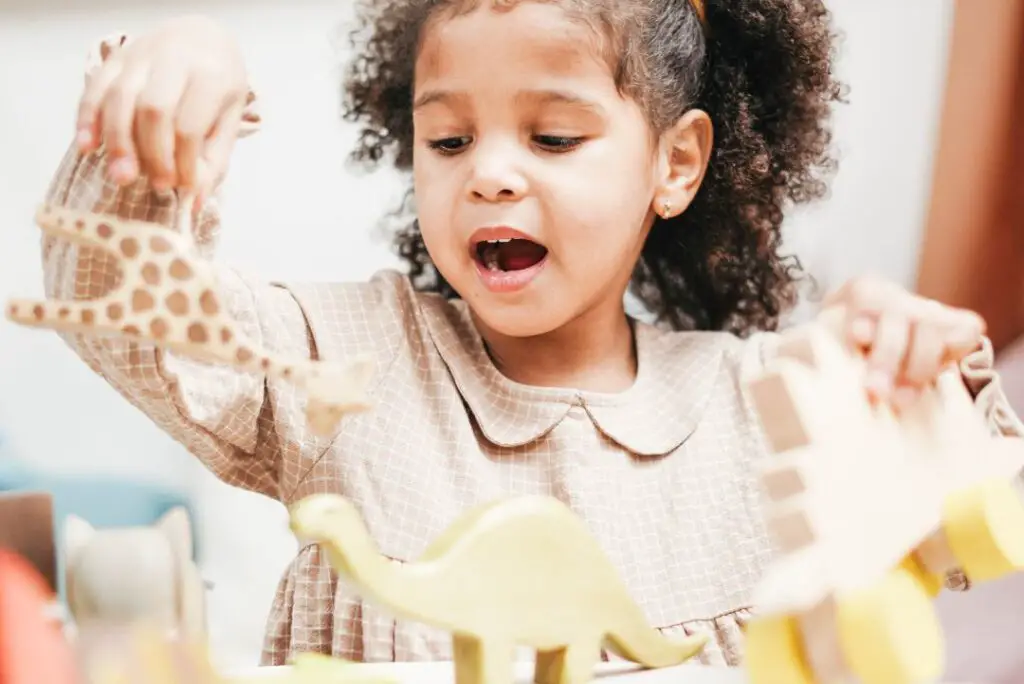
For new parents, it may be hard to find activities to encourage independent play. But believe me, all you need is a bit of imagination and willingness to not interfere with your child’s play.
Some examples of independent play activities for infants may include looking at boardbooks, stacking blocks, or interacting with their play gym.
Toddlers may be ready for more complex activities like working with Montessori puzzles, coloring and painting, playing in their play kitchen, or even doing activities of everyday life like cleaning or organizing their bookshelf.
The outdoors offers so many developmental benefits. With supervision from the adult, outdoor independent play can be as simple as collecting rocks during a hike or building a dam in the creek or river.
Independent playtime by age
For how long should babies play by themselves? Independent playtime lengths vary by age. There are no set guidelines but below are some lengths based on a child’s age.
- Newborn to 3 months. At this age, your baby will need a lot of supervision and guidance. Babies can play for just a couple of minutes before they lose interest.
- 3 to 6 months. Babies can bat at hanging mobiles or explore with certain toys for about 5-10 minutes.
- 6 to 12 months. At this age, infants may be able to sit and some could be walking. 10 minutes of independent play is a good length.
- 12 to 18 months. At this age, toddlers can play alone for about 20 minutes. Our daughter can spend a good amount of time in her play kitchen.
- Over 18 months. Older toddlers, preschoolers and children may be able to play alone for over an hour, provided with the right engaging independent play activities.
Best toys to encourage independent play
As mentioned at the beginning of this article, there is a big difference between playing and entertaining. Selecting the right developmentally appropriate toys can also encourage independent play in your infant or toddler.
Some of the best toys for encouraging independent play include play gyms like the Lovevery Play Gym. This is a play gym that comes with various items that can stimulate your baby’s senses and contribute to their overall development. The best part about the Play Gym is that it grows with your child, so you can use it from the newborn stage to toddlerhood.
Lovevery also has Play Kits that are age-appropriate. Each Play Kit comes with a set of toys for encouraging independent play and is good for three months. Every three months, Lovevery will send you a new set of toys to continue to aid in your child’s development.
Building blocks like the Melissa & Doug are great Montessori independent play toys because they are open-ended. Children can do anything they want with building blocks, their only limit is their imagination. Building blocks help children improve hand eye coordination and fine and gross motor skills.
Sensory tables can provide independent play for many years, in addition to providing many sensory benefits. Fill it up with sand, water, figurines, and your child can spend hours playing. Make sure you read our article on sensory activities for your baby.
Final thoughts on Montessori Tips To Encourage Independent Play In Infants And Toddlers
Independent play is when your child plays alone without interruption. Sometimes it may be hard for parents to step back and let our children play and explore on their own. I get it, as parents, we want to be there for our children.
But sometimes the best thing we can do for our children is to take a step back and watch our children play independently. You’ll be amazed at how they use their creativity and imagination to accomplish big things!

Hello, I am Leslie. I am on a mission to help you support the growth and development of your child. With the right tools and proper guidance, you can navigate parenthood with confidence and assertion! My goal is to equip you with knowledge to help you construct a strong foundation for your child’s life.
Suggested articles
You May Also Like

5 Best Cribs For Short Moms: Never Fall In Again
This is a full list of the best cribs for short moms. These cribs are less than 40 inches high, which is ideal for all of us short moms out there!

3 Best Bottles For Tongue Tied Babies: Our Positive Experience
The best bottle for a tongue tied baby is the Comotomo Baby Bottle. This bottle is life-changing because it feels soft like the real breast and the design of the nipple made it easy for our daughter to latch.

Montessori Potty Training: 11 Proven Tips
I am going to share my experience, both as a mother and as a Montessori Guide to help your child go potty all on their own. In no time, your child will become fully independent and take charge of their own toileting needs.

